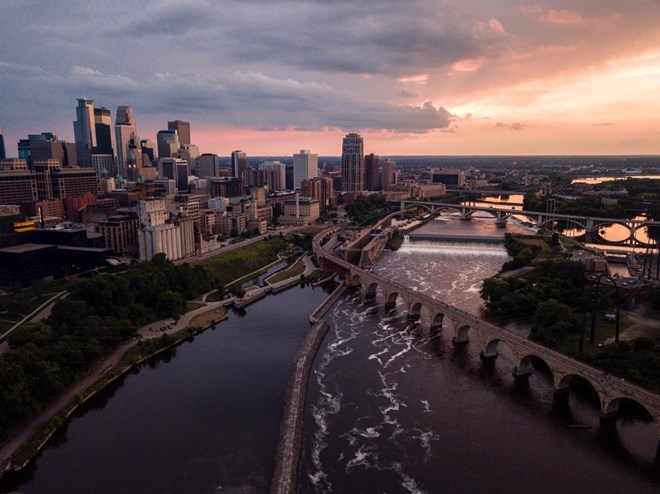
Wednesday August 26, 2020
By Mary Turck

Nicole Geri/Unsplash
Black Minnesotans are more than five times more likely than White Minnesotans to be infected with COVID-19, more than three times more likely to be hospitalized, and three or four times more likely to die. Similar disparities affect other communities of color. COVID-19 hits Latino, Asian, and Native American Minnesotans harder than White Minnesotans.
These numbers should surprise no one. They are just the latest in a long parade of disparities.
Back in March, someone said, “COVID doesn’t see color.” This week, Democratic Vice Presidential Nominee Sen. Kamala Harris answered back, telling the whole country the truth that the virus is not an equal opportunity offender, and why: “This is not a coincidence. It is the effect of structural racism….
“This virus has no eyes, and yet it knows exactly how we see each other—and how we treat each other. And let’s be clear—there is no vaccine for racism. We’ve got to do the work.”Doing the work includes telling the truth about COVID disparities and acting to protect elders and children and communities hit hard by the racial disparities in COVID-19.
COVID-19 builds on existing health disparities. For example, Black Americans have higher rates of asthma than White Americans. Asthma is a risk factor for COVID-19. Someone with asthma is more prone to infection. Their recovery from COVID-19 is likely to be more difficult. Other risk factors include diabetes, COPD, heart disease, kidney disease, and obesity. Each of these diseases or conditions affects Black Americans at a higher rate than White Americans. Each puts Black Americans at higher risk of COVID-19 infection.
These health disparities have deep racist roots. Take asthma as an example. Black people are more likely to live in communities with higher air pollution. So are Hispanic people and families with low incomes. Higher air pollution is a major risk factor for asthma.
Racism itself is a risk factor. According to the American Lung Association, “Higher-income Blacks who had higher income than many whites still faced greater risk than those Whites, suggesting that the impact of other factors such as chronic stress as a result of discrimination may be playing a role.”
Black, Latino, and Asian Minnesotans have higher exposure to COVID-19. They are more likely to work in front-line jobs. They are less likely to be able to work from the relative safety of home. Health care workers are on the front lines, but they are not the only ones. Grocery store clerks cannot work from home. Construction workers and bus drivers can’t call it in. Going to work and using public transportation increase COVID-19 infection risk.
Risk is a relative term. Individuals and communities can act to increase or decrease risk. Besides the big battles against structural racism, smaller, daily acts of resistance can lessen the risk of COVID-19.
Generations of mothers and grandmothers told us: Wash your hands. Cover your coughs and sneezes. Clean and disinfect.
To this good advice, the Centers for Disease Control and doctors add: Wear a mask. Avoid close contact with others.
After a slow start, testing is now available. Anyone feeling sick should get a test. The state health department has a map and listing of test sites, dates, and times.
The City of Minneapolis has free testing on August 25, 26, and 28 and September 11, 12, 19 and 26. All are welcomed. (See testing sites below)
- Free COVID-19 testing focused on PICA Head Start families: 11 am-7 pm Tuesday, Aug. 25 @ McKnight Early Childhood Family Development Center, 4225 Third Ave. S. Hmong, Somali and Spanish interpreters will be onsite. Arrive on foot or by car. Register here.
- Free COVID-19 testing focused on Black, Indigenous and people of color communities: 2-6 p.m. Tuesday, Aug. 25, and Wednesday, Aug. 26 Calvary Lutheran Church parking lot, 3901 Chicago Ave. S. Tests are given to people on foot.
- Free COVID-19 testing focused on the north Minneapolis community: Noon-7 p.m. Friday, Aug. 28 New Salem Baptist Church, 2507 Bryant Ave. N. Tests are given to people on foot. Register here.
- Free COVID-19 testing focused on the north Minneapolis community: Noon-4 Friday, Sept. 11, and Saturday, Sept. 12 Shiloh Temple, 1201 W. Broadway Ave. N. Register onsite.
- Free COVID-19 testing focused on the East African community: Noon-5 p.m. Saturday, Sept. 19 Abubakar As-Sadique Islamic Center, 2824 13th Ave. S. Register onsite.
- Free COVID-19 testing focused on the East African community: Noon-5 p.m. Saturday, Sept. 26 Abubakar As-Sadique Islamic Center, 2824 13th Ave. S. Register onsite.